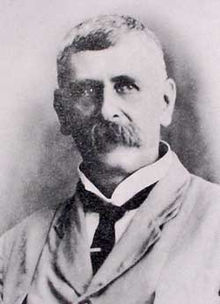- Walter Roth
-
Walter Edmund Roth (2 April 1861 – 5 April 1933) was an English anthropologist and physician, active in Australia. He and his brother, Henry Ling Roth, are the subject of The Roth Family, Anthropology, and Colonial Administration.[1]
Contents
Protector of Aborigines
He was appointed the first Northern Protector of Aborigines in 1898 and was based in Cooktown, Queensland. From 1904 to 1906 he was Chief Protector and part of his duties was to record Aboriginal cultures.
The first three of his Bulletins on North Queensland ethnography were published in 1901, numbers 4 to 8 appearing between 1902 and 1906. In 1905 he was appointed a royal commissioner to inquire into the condition of the aborigines of Western Australia, and in 1906 he was made government medical officer, stipendiary magistrate. The remainder of Roth's bulletins on North Queensland ethnology, began to appear in the Records of the Australian Museum at Sydney in 1905; and numbers 9 to 18 will be found in volumes VI to VIII. He was given charge of the Demerara River, Rupununi, and north-western districts in 1915.
British Guiana
In 1906 Roth was made protector of Indians in the Pomeroon district of British Guiana. In 1924 his valuable An Introductory Study of the Arts, Crafts, and Customs of the Guiana Indians was published at the government printing office at Washington, U.S.A., appended to the Thirty-eighth Annual Report of the Bureau of American Ethnology. Though called an introductory study this is an elaborate work of well over 300,000 words with hundreds of illustrations. A volume of Additional Studies of the Arts, Crafts, and Customs of the Guiana Indians was published in 1929 as Bulletin No. 91 of the Bureau of American Ethnology. Roth retired from the government service in 1928, and became curator of the Georgetown museum of the Royal Agricultural and Commercial Society, and government archivist. Towards the end of his life he translated and edited Richard Schomburgh's Travels in British Guiana.[2]
Professional recognition and awards
The Walter Roth Museum of Anthropology in Georgetown, Guyana has been named in his honour.
Controversies
According to Barrie Reynolds of James Cook University:
- "Roth proved a vigorous Protector...earn[ing] for himself the hostility of the local European residents of north Queensland that was to erupt in 1905 in a public petition for his dismissal." [3]
Roth was involved in an incident where he "paid" an Aboriginal couple to demonstrate a sexual position of which he then took photographs. In 1904 and 1905, speeches in the Queensland Parliament on this and other aspects of his work were said to form "a pile as high as the Eiffel Tower".[4]
- “Hansard teemed with speeches delivered against the administration of Dr Roth until they had a pile as high as the Eiffel Tower, and the Minister brushed everything aside as he would a fly from his aristocratic nose.”[5].
Although Roth defended his actions by stating the photograph was taken for purely scientific purposes only,[6] the controversy led to his resignation on the grounds of ill health and departure for British Guiana (as it was then known) in 1906.
Dr Pringle writes of the episode that in her view:
- Forcing, or persuading, Aborigines to perform sexual acts like performing bears for a white male audience fits squarely even within then current criteria of enslavement, a heinous crime that shocks the conscience of mankind then and now.
On-line publications
- Roth, Walter Edmund (1897) Ethnological Studies Among the North-west-central Queensland Aborigines E. Gregory, Government PrinterAccessed 16 March 2009.
References
- ^ Russell McDougall & Iain Davidson, (2008), The Roth Family, Anthropology, and Colonial Administration, Publications of the Institute of Archaeology, University College London Institute of Archaeology Publications, Left Coast Press ISBN 9781598743524
- ^ Percival Serle, ed (1949). "'Roth, Walter Edmund". Dictionary of Australian Biography. Angus and Robertson. http://gutenberg.net.au/dictbiog/0-dict-biogR.html#roth2. Retrieved 2007-07-28.
- ^ Roth, W. (1984) The Queensland Aborigines, 1984 facsimile edition, Queensland Government Printer; originally Ethnological Studies among the North-West-Central Queensland Aborigines (1897).
- ^ Dr Helen Pringle, The Fabrication of Female Genital Mutilation: The UN, Walter Roth and Ethno-Pornography, http://www.adelaide.edu.au/apsa/docs_papers/Others/Pringle.pdf
- ^ Mr Lesina, Queensland Parliamentary Debates (QPD), 24 November 1905, 1810
- ^ According to Roth: "The description and illustration of the posture assumed in the sexual act was of the highest anthropological interest in that it in large measure defended my thesis that the mutilation known as Sturt's terrible rite, or sub-incision (by Professor Stirling) or intro-cision (by myself) did not act as had hitherto been supposed as a preventive to procreation...The photograph was taken for purely scientific purposes only and is one of a series (defecation, micturition, tree climbing, sitting, standing) of natural postures which every anthropologist makes inquiry about, with a view to ascertaining the connections (if any) between the highest apes and the lowest types of man." Roth to Bishop White, 19 June 1904, QSA A/58850, tabled in QPD, xcii, 13 July 1904, 585. Bishop White wrote to Roth on 3 June 1904, and Roth’s reply is dated 19 June 1904. White telegrammed that he was satisfied with Roth’s explanation, letter of 8 July 1904.
External links
- Barrie Reynolds, 'Roth, Walter Edmund (1861 - 1933)', Australian Dictionary of Biography, Online Edition, Australian National University Accessed 6 February 2009
- Walter Roth Museum of Anthropology
Awards Preceded by
Walter HowchinClarke Medal
1909Succeeded by
William Harper TwelvetreesCategories:- 1861 births
- 1933 deaths
- Australian anthropologists
- British anthropologists
- Alumni of University College London
- People from London
- Australian people of English descent
- Old Gowers
Wikimedia Foundation. 2010.

